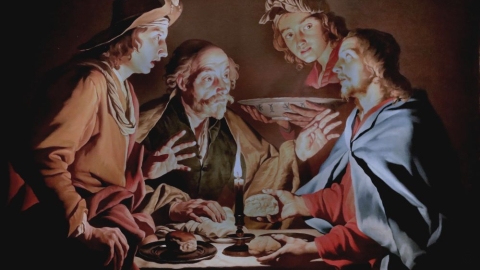France: Catholic Doctrine Indicted

The Holy Bible
On February 24, 2021, the director of publication of the Renaissance catholique website, Jean-Pierre Maugendre, was indicted for “inciting discrimination against a group of people on the basis of their sexual orientation.”
This indictment follows a complaint, with the constitution of a civil party, filed on July 30, 2020, by the association “Stop homophobia.”
In a press release posted online on March 2, 2021, Renaissance catholique explains that it is being criticized for having published, on June 13, 2019, an article which read:
“The civil power may not establish civil or legal unions between two persons of the same sex that plainly imitate the union of marriage, even if such unions do not receive the name of marriage, since such unions would encourage grave sin for the individuals who are in them and would be a cause of grave scandal for others.” (cf. Congregation for the Doctrine of the Faith, Considerations Regarding Proposals to Give Legal Recognition to Unions Between Homosexual Persons, June 3, 2003).”
The incriminated text was signed by Cardinals Raymond Burke, Patron of the Order of Malta, Jãnis Pujats, Archbishop Emeritus of Riga, and Bishops Tomasz Bernard Peta, Archbishop of Astana in Kazakhstan, Jan Pawel Lenga, Archbishop Emeritus of Karaganda in Kazakhstan , and Athanasius Schneider, Auxiliary Bishop of Astana.
Questioned by Famille Chrétienne on March 4, Mr. Jérôme Triomphe, lawyer for Jean-Pierre Maugendre, declared: “I see no other way out than an acquittal. The Stop Homophobie association claims that this publication would constitute an incentive for mayors and civil authorities to refuse to perform civil marriages. This is ridiculous!”
“You can imagine that neither Christiane Taubira nor Anne Hidalgo nor any of those who defend civil marriage between two people of the same sex, will tremble with scruples after having read Cardinal Burke and the reminder of the Catholic doctrine on marriage and homosexuality!”
For his part, Jean-Pierre Maugendre, interviewed by Jeanne Smits on her blog on March 5, affirms that the substantive question that will be addressed during this trial will be as follows:
“Does the Church still have the freedom to have a moral teaching that is not modeled on civil legislation?”
And he adds: “In the secularized society in which we find ourselves today, does the fact that the political authorities completely identify the civil law with the moral law (where one deems that what is permitted by the civil law is moral, and that what is prohibited by the civil law is immoral), does this approach allow the Church to publicly express her moral teaching even though it is sometimes contrary to the civil law?”
Jeanne Smits then asks, “very recently, last year, the Pope has been said to have shown a kind of indulgence, or even to have promoted civil unions for homosexuals. Could it be that the Pope’s attitude has facilitated the steps taken by “Stop Homophobie”?
Jean-Pierre Maugendre replies: “Undoubtedly, since today, the least we can say is that there is great confusion in the Church on doctrinal, moral, and liturgical questions, and even though the Pope may say otherwise, the world in which we find ourselves is such that a certain number of ambiguous remarks that he makes will be used in the sense of a break with the Tradition of the Church.”
“The Supreme Pontiff has introduced two novelties: First of all, he speaks a lot without always having prepared his statements: on the plane, during meetings with journalists, etc., which was not done before. The other novelty can be seen, for example, in the encyclical Fratelli tutti, when the Pope says: “Let’s dream” and uses the personal pronoun “I.”
“In the past the popes did not use the personal pronoun “I,” they used the pronoun “We,” which was not so much a plural of majesty as the visible meaning of: “We, the successor of Peter, in apostolic continuity, with the assistance of the Holy Spirit, this is what we declare to you,” which obviously gave an authority to these words that Pope Francis does not have when he says (as he did in Evangelii gaudium or Querida Amazonia): “I dream.”
“His dreams are very interesting, certainly, but they do not have the authority of a Pope who, with the help of the Holy Spirit, positions himself in the continuity of two thousand years of the Church. We have really moved on to another mode of communication which is a profound factor of confusion on the one hand, and on the other hand, allows the use by the enemies of the Church of the ambiguities thus created.”
In the interview given to Famille Chrétienne, cited above, Mr. Triomphe believes that these types of attacks must be taken very seriously. “This is an offensive against the freedom of the Church. Under the guise of an alleged incitement to discrimination, lobbies that moreover represent only a tiny minority of homosexuals are attempting in practice to have Catholic doctrine and natural law declared outlawed, which it then would no longer be possible to express.”
“Make no mistake: there is a groundswell that is taking shape. The government claimed a few months ago to extend secularism into the public space by claiming to prohibit Catholics from praying on the public streets. If we do not oppose it, the temptation will be great for an even more oppressive government to one day impose bringing Catholic doctrine into conformity.
And a warning: “I am confident, but we should never believe that freedom has been won. Catholics must fight these offensives and protest because no one will defend the freedom of the Church in their stead.”
(Sources : Renaissance catholique/Famille chrétienne/J. Smits/DICI n°406 – FSSPX.Actualités)
Illustration : iStock / D-Keine



